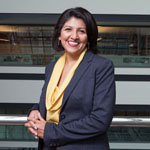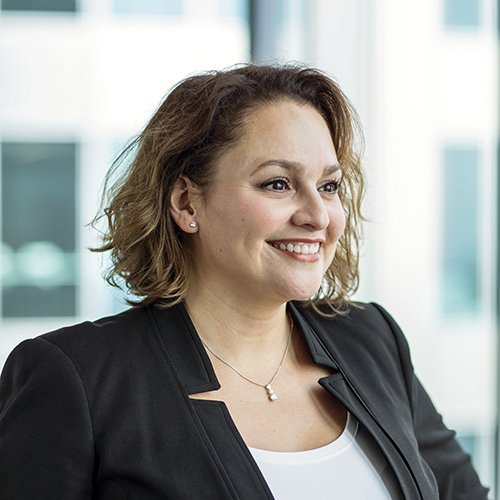Martin Rodriguez doesn’t just staff “the Fed” (Federal Reserve Bank of New York); he’s shaping the bank’s future by scouting talented graduates
Martin Rodriguez was the first in his family to go to college. It’s because he didn’t want to leave college, however, that he ended up in human resources. “I loved being on a college campus,” says Rodriguez, who joined the Federal Reserve Bank of New York in 2009 and now serves as its director of diversity relations and head of campus recruitment. “It has an energy to it that you just can’t find anywhere else.”
That energy seduced Rodriguez when he was an undergraduate at Stony Brook University. Because he’d worked in the admissions office there and liked it—and wanted to continue working at a university—he eventually accepted a position in the admissions office at New York University’s Leonard N. Stern School of Business, where he worked for six years.
The son of Puerto Rican parents, Rodriguez grew up in the Bronx, where he lived in the projects and helped his father—a factory worker and handyman—with odd jobs on the weekends. The corporate world, therefore, was entirely foreign. At NYU, however, he served the school’s MBA program and, surrounded by businesspeople, became convinced his next job should be corporate.
When Goldman Sachs offered him a job, he took it … eventually. “I actually turned down my initial offer from Goldman,” says Rodriguez, who declined the job of campus recruiting analyst to hold out for a more senior opportunity—which he got a few months later when Goldman offered him a position on its diversity-recruitment team. “When I was at NYU, [the school] began taking a more aggressive approach to recruiting diverse professionals to pursue an MBA. I had an opportunity to help build its diversity-recruiting strategy, which ultimately led me to a continued interest in diversity. That’s what made the opportunity at Goldman so appealing; I had helped recruit [diverse] professionals to pursue an MBA, and now I had the opportunity to recruit that same talent when they were done with their MBA.”
Self Review
What do you do for fun?
My dad was a handyman, so I got a chance early on to be a handyman myself. I actually remodeled the entire kitchen in our previous home. I take pride in being able to put on a suit and tie on Wall Street, and then come home on the weekends to roll up my sleeves and build something.
You recently became a father. How has
that changed you?
I finally get what everyone means when they say your life changes when you become a parent. I’ve only been a parent for a little less than 19 months, and already I see what this truly means. It’s helped me put things into perspective at work.
What gets you up in the morning?
My best friend died from colon cancer about 12 years ago. Ever since that happened, I’ve learned to appreciate every moment and every day. When I get up in the morning, it’s a blessing to see my family, obviously, but just having the opportunity to put on my shoes, get in the car, and go to work doing something meaningful is something I don’t take for granted.
You come from very humble beginnings. How do your parents feel about your success?
My parents don’t really understand what I do, but when they look at what my wife and I have been able to achieve together at this early stage in our lives, such as buying our home, having our first child, and traveling the world—things that, aside from having kids, they weren’t able to do—I know they’re very proud.
As a vice president at Goldman Sachs, Rodriguez recruited MBA students as interns and employees and maintained relationships with diversity organizations such as the Robert Toigo Foundation, ALPFA, and the Consortium for Graduate Study in Management. During his tenure, his proudest achievement was establishing a recruiting strategy in Puerto Rico.
“There was a lot of untapped talent in Puerto Rico,” Rodriguez says. “I, along with a number of other key people at Goldman Sachs, implemented a strategy that helped us target a number of schools on the island. Within a year and a half we successfully recruited more than 30 students to work full-time at the bank. When you think about how competitive campus recruiting is—we would go to Penn, Harvard, Stanford—the fact that we were able to recruit in Puerto Rico was pretty amazing and a testament to the people at the firm seeing the value these students had to offer.”
When the financial crisis hit in 2008, it opened the door to a new opportunity. “As many organizations were downsizing, the Fed was doing just the opposite,” says Rodriguez, who joined the Federal Reserve Bank of New York—one of 12 regional banks that are part of the central banking system of the United States—in spring 2009. “It needed to expand and grow in order to implement all the policies, programs, and changes that were being made in an effort to stabilize the economy.”
In his current role, Rodriguez continues to specialize in diversity outreach and campus recruitment. On both fronts, he’s succeeding with a strategy that utilizes senior leadership to sell the Fed as a desirable workplace. “The Fed does wonderful work, but too often students don’t know what we do,” Rodriguez explains. “By taking our senior leaders to campus to share the Fed’s story, we feel we can identify the top students on campus and ensure they’re looking to us as an employer of choice. This strategy already is paying off. Last year we converted more than 80 percent of our interns [to full-time employees], and this year we’re on track to convert more than 85 percent.”
Because the Fed has both public and private components, campus recruitment isn’t easy. “We have a different mission than a bank,” Rodriguez says. “So, we have to find that unique individual who has an interest not only in financial services, but also in public service.”
Students themselves are another challenge. Although competition for a limited number of jobs is high—especially in a down economy—they have a “what’s-in-it-for-me” mentality that means recruiters have to work especially hard to court the most promising candidates. “Millennials have changed how we look at recruitment,” explains Rodriguez, who says the successful recruiter must be able to provide specific examples about the actual job, as well as insights about career growth and leadership opportunities. “Students expect you to be knowledgeable not only about the opportunity, but also about the organization, the culture, and their future. They want to know not just what the job is, but what it’s like to work at the organization and what types of projects they’ll be working on.”
Those challenges and others have prepared Rodriguez for the next phase of his career: having spent so many years recruiting employees, he now wants to help retain them by taking on more talent-management responsibilities. Still, he’ll always be a campus recruiter at heart. “Until I’m considered to be too old to be on campus, I’ll keep enjoying campus recruitment,” he laughs.

